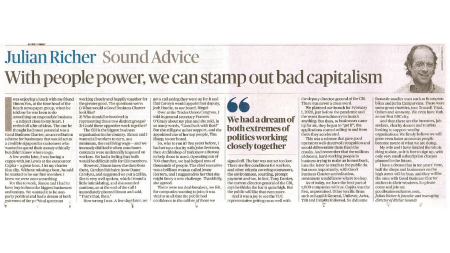With people power, we can stamp out bad capitalism
5th March, 2022
First printed in the Sunday Times, online 5 March 2022 and in print 6 March 2022
“I was enjoying a lunch with my friend Simon Fox, at the time head of the Reach newspaper group, when he told me he was keen to do something on responsible business — a subject close to my heart. I reeled off a list of ideas.
 The one he thought had most potential was a Good Business Charter, an accreditation scheme for businesses that would act as a credible signpost for customers who wanted to spend their money ethically but didn’t know where to go.
The one he thought had most potential was a Good Business Charter, an accreditation scheme for businesses that would act as a credible signpost for customers who wanted to spend their money ethically but didn’t know where to go.
A few weeks later, I was having a cuppa with Jon Lewis at the outsourcer Capita — a great boss. I let my charter idea slip. Without missing a beat, he said he wanted to be our first member. I knew we were onto something.
For this to work, Simon and I had to have buy-in from the biggest businesses and unions. We wanted it to be non-party political and had a dream of both extremes of the political spectrum working closely and happily together for the greater good. The questions were:
1) What would a Good Business Charter look like?
2) Who should be involved in representing these two distinct groups?
3) Could these opposites work together?
The CBI is the biggest business organisation in the country. Simon and I wanted all workers to earn, as a minimum, the real living wage — and we intensely disliked it when zero-hours contracts were unilaterally imposed on workers. We had a feeling that both would be difficult calls for CBI members.
However, Simon knew the then-boss there, Carolyn Fairbairn (now Dame Carolyn), and suggested we put a call in. She is very well spoken, which I found a little intimidating, and she sounded cautious, so at the end of the call I immediately phoned Simon and said, “That’s that, then.”
How wrong I was. A few days later, we got a call saying they were up for it and that Carolyn would appoint her deputy, Josh Hardie, to our board. Bingo!
Over at the Trades Union Congress, I told its general secretary Frances O’Grady about my plan and she said, in so many words, “Good luck with that!” But she still gave us her support, and she appointed one of her top people, Tim Sharp, to our board.
So, who to run it? Ten years before, I had set up a charity with John Sentamu, then Archbishop of York (now a Baron) to help those in need. Operating out of 700 churches, we had helped tens of thousands of people. The chief executive was a brilliant woman called Jenny Herrera, and I suggested to her that she might fancy a new challenge. Thankfully, she agreed.
There were ten deal-breakers, we felt, for companies wanting to join; it was vital to us all that the public had confidence in the calibre of those we signed off. The bar was not set too low. There are five conditions for workers, and other criteria covering consumers, the environment, sourcing, prompt payment and tax. In fact, Tony Danker, the current director-general of the CBI, says he thinks the bar is quite high. But the public will like that even more.
And it was a joy to see the TUC representative getting on so well with the deputy director-general of the CBI. There was never a cross word.
We planned our launch for February 1, 2020, just before the pandemic and the worst time in history to launch anything. But then, as businesses came up for air, they began to “get it”; the applications started rolling in and from there they accelerated.
This was a scheme that gave good operators well-deserved recognition and would differentiate them from the crooks. And remember that the millions of decent, hard-working people in business trying to make an honest buck, hate the latter as much as the public do. But more importantly, with Good Business Charter accreditation, consumers would know where to shop.
As of today, we have the best part of 1,000 companies with us. Capita was the first, as promised. Other terrific firms such as Legal & General, Unilever, Aviva, TSB and Deloitte followed. So did some fantastic smaller ones such as Brompton bikes and Jerba Campervans. There were some great charities, too: Trussell Trust, Oxfam and Amnesty. We even have York as our first GBC city.
And then there are the investors, job seekers, charity donors and tourists looking to support worthy organisations. We firmly believe we will grow even faster as soon as people become aware of what we are doing.
My wife and I have funded the whole thing to date, so it is free to sign up, with only very small subscription charges planned in the future.
I have a dream that in ten years’ time, half the shops and businesses on the high street will be busy and they will be the ones with Good Business Charter stickers in their windows. So please come and join us: goodbusinesscharter.com.”
Comment
When this article was published in The Sunday Times we did have some mixed feedback which we would like to respond to here. Some readers were particularly critical about Capita and we are taking these concerns very seriously. We do draw a line between historic behaviour where there has been a change of approach and an evidenced commitment to our principles of responsible business behaviour. However, we will not accept businesses committing to something and clearly not outworking that in their day-to-day activities. Julian has contacted Capita’s CEO about these concerns and we will be carefully monitoring them.

